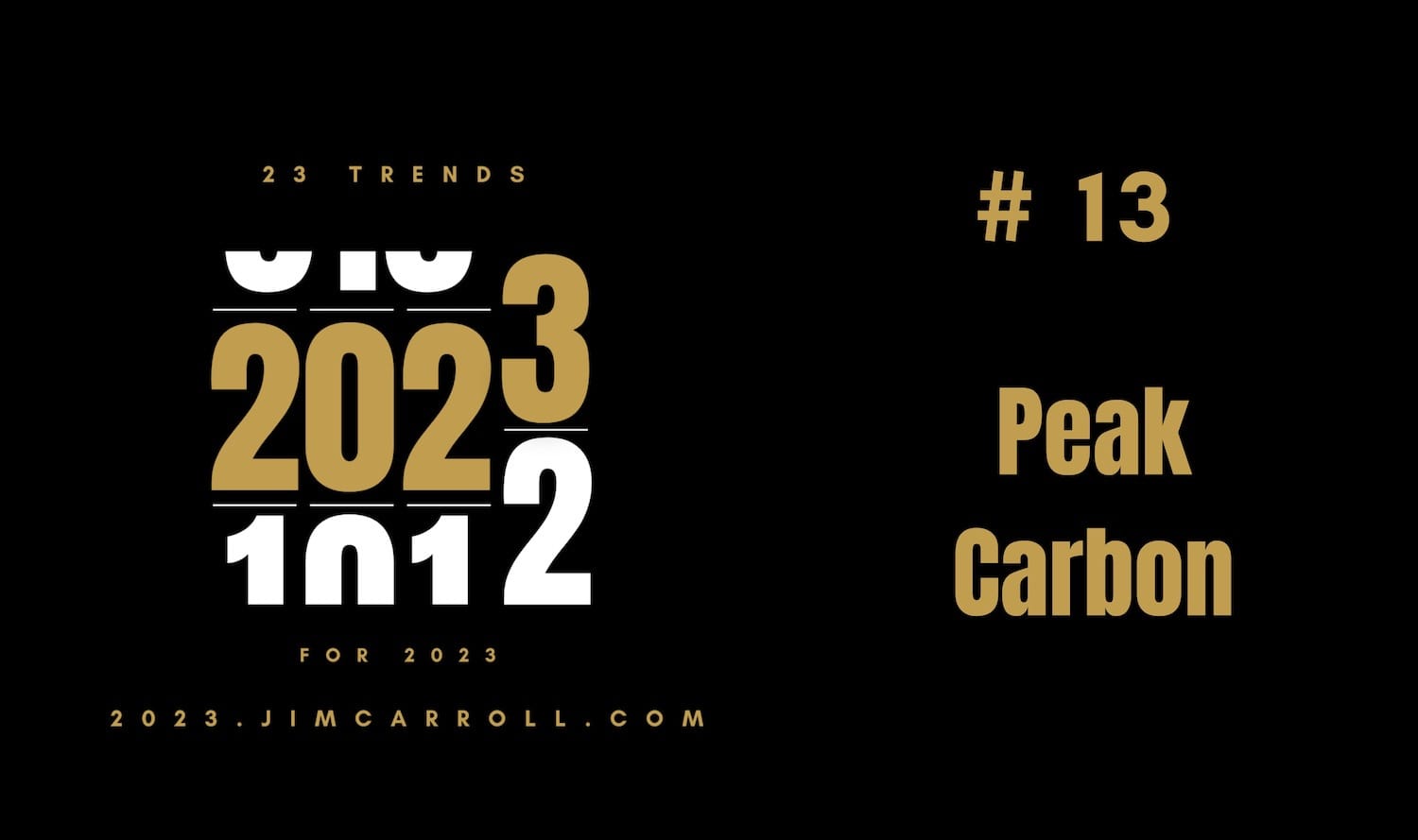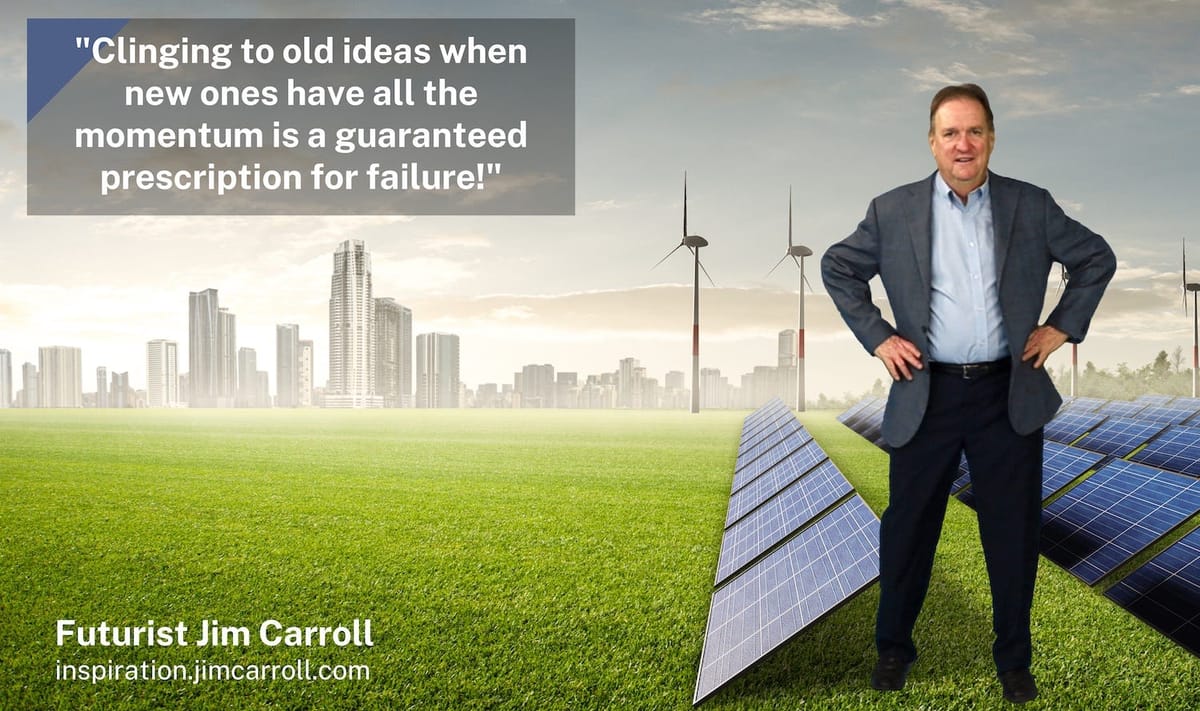We all know the phrase - insanity is doing the same thing and over again and expecting a different result each time. It doesn't happen. Neither does the mindset of clinging to old business models, out-of-date product ideas, irrelevant concepts, and reliance on yesterday's strategy. In the context of that, it also includes the end of the era of oil and carbon - the focus on trend #13 of my 23 Trends for 2023, Peak Carbon.
Because essentially, oil is over.

My post will include all kinds of charts and graphs and statistics and observations. It's pretty certain that some folks will try to draw me into a micro-argument of sorts, but they fail to miss the point - the direction of our future has shifted.
Forever.
What is certain is that from an economic and momentum perspective, the idea of carbon as our primary energy source is essentially done. Carbon usage might peak in 2023 or maybe not (likely not), but what has peaked is our belief that it is the main energy input going into the rest of the century. Because it won't be.
Simply put, there is way too much momentum with the 'other stuff.' The cost of solar energy generation continues to collapse at a staggering pace. Most new cars and trucks will be electric within ten years. Batteries are becoming the heart of our energy grid, vehicles and so much more Oil companies get it, and they are busy fashioning a future based on the production of petrochemical substances rather than energy carbon, recognizing their days are done. Most new investments in energy - 90%+ - will go into renewables, batteries, and the grid instead of oil and carbon. That's not from me - that's from Bloomberg. And on the horizon is then the fascinating potential of energy fusion - although the excessive hype last week would make something that it is imminent. (Hint: it isn't.) (The wingnut set will argue something about the unreliability of wind generation because of wind, but they are too busy being wingnuts to understand there is this thing called batteries.)
The era of oil is over. Carbon is done. Natural gas is but an insurance policy. Coal? Laughable.
Only a fool clings to old ideas when their irrelevance is guaranteed, and that's the case with carbon. It's also the case with everything else. Your business model is probably done. The product or service you sell might already be out of date, and if you are reinventing fast enough, you won't keep your relevance going forward. The skills base you are relying on right now won't cut it tomorrow. The structure you have in place that worked yesterday won't work in the hyperspeed economy of tomorrow that is already here today. Need I go on?
Only the drowning seizes the life preserver that is already sodden, full of water, guaranteed to drag you under.
That's you if you don't recognize the futility of clinging to yesterday when tomorrow is already here! So what do you do about this?
- challenge your belief system. You can choose to believe what you want to believe, but that doesn't make it real - and in fact, it's most likely very destructive.
- abandon a mindset of perpetual denial. Don't become so blinded by the success of your past that they consider your future to be guaranteed.
- avoid wishful thinking. Don't allow yourself to foster a belief system that generates a continual state of false reality, based on wishful thinking, denial of the truth, and blind loyalty to ultimately destructive ideas
- confront your future, don't avoid it. An ongoing belief in the fantasy of your unrealistic fiction is not just wrong - it's harmful!
- study the leaders. Make up a list of your most potent and challenging competitors. Study what they are doing that you are not, and learn from it.
- rethink your future. Take a good hard look at the product or service that you are offering, and ask yourself some hard questions as to how it might be fundamentally different, on a 1, 2, 5, and 10-year basis
- examine your skills. Do an inventory of your current skill set availability, and challenge yourself as to whether it will be adequate to take you forward into the future.
- challenge your culture. Undertake an honest assessment of your corporate culture, and identify the attitudes and actions that drive your culture of complacency
- be brave. Challenge yourself with the hard and realistic questions that matter - not the easy ones based on denial that guarantees a path to failure.
After all, there's a reason we call them old ideas. Think about it!
Futurist Jim Carroll is a futurist because he is focused on tomorrow - it sort of makes sense. This, of course, sometimes causes great frustration for his wife, as he will not be terribly mindful of the things that need to be done today.

